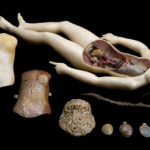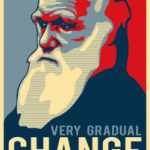Science
Wax anatomical figure of reclining woman, Florence, Italy, 1771-1800
Science Museum London
Starting today, the Wellcome Trust and sciencemuseum.org.uk open a brand spanking new collection of medical history archives. "Brought to Life: Exploring the History of Medicine" is searchable by people, place, thing, theme, and time. You can view a timeline of medical history in Europe next to similar timelines for the Islamic empire, Egypt and Greece (I do wish China and India were as prominently placed). You can read essays about larger questions, like what "wellness" means, or play with a cool…
Over the weekend, some readers sent me a link to a story that, presumably, they thought would be of interest to me, given that I graduated from the University Michigan Medical School back in the late 1980s. Specifically, it's a report that U. of M. has halted the use of dogs in its surgical training:
Surgeons training at the University of Michigan Health System will no longer use live, healthy dogs to learn drastic surgical procedures that can save people's lives, the university announced Thursday.
The anesthetized animals -- obtained from shelters -- were used to teach tracheotomies, how to…
Matthew Nisbet says maybe, but not by much.
I
n the U.S., there is often the false assumption that Europeans are somehow more engaged and supportive of science than Americans. Yet, as I discuss in several studies and as I have written about in articles, instead of science literacy, the same generalizable interaction between values, social identity, and media portrayals drive European perceptions of science debates. Indeed, cross-national survey studies show that while science remains the most widely admired and respected institution in American society, Europeans are far more ambivalent…
A partial list of phrases I would like bound to a macro key, to save myself typing them over and over again as I mark up student lab reports (not all of these apply to the current crop of students):
Not only were you able to [verb] the [noun], you did [verb] the [noun]. Say that directly.
You are describing an experiment that you did a week ago. That makes it a little odd to talk about what you "hope to find" in your report.
Do not talk about the educational purpose of the lab. Pretend that you did this experiment on your own, because you wanted to learn something, and not because I made you…
image by Mike Rosulek
buy merchandise here to benefit NCSE
It's a classic question: if Charles Darwin had known about Gregor Mendel's genetic research, would Darwin have realized it was the missing piece he needed to explain how individual variation was inherited and selected? Was it simply bad luck that Darwin never stumbled on the right experiments? Or was Darwin so constrained by his own perspective on inheritance that he couldn't have seen the importance of Mendel's work, even if he had known about it?
Jonathan Howard has written an intriguing overview of this question. He argues that…
tags: Birdbooker Report, bird books, animal books, natural history books, ecology books
"One cannot have too many good bird books"
--Ralph Hoffmann, Birds of the Pacific States (1927).
The Birdbooker Report is a special weekly report of a wide variety of science, nature and behavior books that currently are, or soon will be available for purchase. This report is written by one of my Seattle birding pals and book collector, Ian "Birdbooker" Paulsen, and is edited by me and published here for your information and enjoyment. Below the fold is this week's issue of The Birdbooker Report which…
Those of you who were into ants in the early '90s might remember SimAnt, a simulation game where you control the decisions your ants make to steer a colony to dominance over a competing species in a suburban lawn.
The game is based, in part, on the optimality equations summarized in Oster & Wilson's 1978 text "Caste and Ecology in the Social Insects". The book lays out mathematical foundations for determining the investments a colony should place in workers, queens, and males in order to optimize Darwinian fitness over a range of ecological conditions. If you knew the…
On Morning Edition this morning, there was a story about the annual Conservative Political Action Conference which contained a line which made me guffaw:
Representative Paul Ryan: "[rant on spending in stimulus plan]...$400 million dollars to study sexually transmitted diseases!" [rant on about how his daughter is more responsible that President Obama]
Oh my! The horror. Actually spending money studying diseases that infect 65 million U.S. citizens. Yes Rep. Ryan, it would be a real shame if that money improved the lives of those 65 million people (and maybe it might even help, you know,…
I had to read it just for the title alone: "Harmonic Convergence in the Love Songs of the Dengue Vector Mosquito". It's got romance, it's got harmony, it's got singing, and best of all, it has that delicious dramatic tension of being all about biting insects known to carry a nasty disease. Even in the lowliest, most obnoxious creatures, biologists find beauty.
I'd tell you all about it — in short, courting mosquitos synchronize their wingbeats to sing in harmony — but Neurotopia beat me to it. When summer comes to Minnesota, I'll have to remember that the incessant whines are actually tiny…
Isn't that beautiful? It's an ancient footprint in some lumpy rocks in Kenya…but it is 1½ million years old. It comes from the Koobi Fora formation, familiar to anyone who follows human evolution, and is probably from Homo ergaster. There aren't a lot of them; one series of three hominin trails containing 2-7 prints, and a stratigraphically separate section with one trail of 2 prints and an isolated single print. But there they are, a preserved record of a trivial event — a few of our remote relatives taking a walk across a mudflat by a river — rendered awesome by their rarity and the…
Via email, Mike Steeves points me to an Ars Technica article about a Thomson Reuters report on the "decline in American science":
The US is beginning to lose its scientific dominance. That's
the message from Thomson Reuters, the people behind EndNote and impact factors.
According to a report in their publication ScienceWatch, the US' science
output is in a shallow decline at the same time that Asia is in the ascendancy.
If it sounds like you've heard that before, you've been
paying attention. Back in 2006 the National Science Foundation's biennial
Science and Engineering Indicators report…
Let's try this again.
Two days ago, I tried to get away from blogging about antivaccinationists. I even succeeded for one day. Unfortunately, that was all, because J.B. Handley and his crew of antivaccine loons cooked up a really big, really deceptive, and really desperate gambit that just couldn't go unremarked upon. Thus was I sucked back in again. Even worse, this all came hot on the heels of a very sad time in the lives of my wife and myself. I needed something to lift my spirits.
And nothing lifts one's spirits quite like fine, grade-A woo.
Or perhaps I need my bio-photons analyzed with…
The media is getting another science story wrong. I keep seeing this discovery of an array of fossil placoderms as revealing the origins of sex, and that's not right. Sex is much, much older, and arose in single-celled organisms. Come on, plants reproduce sexually. A fish is so far removed from the time of origin of sexual reproduction that it can't tell us much about its origins.
Let's get it right. These fossils tells us about the origin of fu…uh, errm, mating in vertebrates.
What we have are a set of placoderm fossils from the Devonian (380 million years ago) of Western Australia (The…
For those scientists out on the job market this year, the following from TheLadders.com might be a little scary:
Two annihilated industries and...science.
I've never understood the controversy over the Superorganism concept. It isn't as though organisms themselves are all that clear-cut, especially when considering oddities like social amoebas and lichens.
photo details: Canon 100mm f2.8 macro lens on a Canon EOS D60
ISO 400, 1/10 sec, f/2.8
"The [Environmental Justice (EJ)] movement," writes Gwen Ottinger, "was galvanized in the early 1980s by the observation that toxic chemicals and other environmental hazards are concentrated in communities of color. EJ activists, many of them veterans of the civil rights movement, began to argue that social equality demanded an end to this 'environmental racism.' Currently, however, it is not equality but health that dominates grassroots activists' campaigns against chemical contamination."
Ottinger is a fellow at the Chemical Heritage Foundation's (CHF) Center for Contemporary History and…
ScienceWoman offers a good discussion question:
You are in a room with a bunch of other female faculty/post-docs/grad students from your university. You know a few of them, but most of them are unfamiliar to you. The convener of the meeting asks each of you to introduce yourself by answering the following question: "What is one aspect of your professional life that you are good at?"
It's a good topic that doesn't necessarily have anything to do with gender or the academy, so I will shamelessly steal it re-pose it without that frame:
What is one thing in your professional life that you do…
As a native of Washington State, where we could literally scoop white ash off the ground in handfuls after Mt. St. Helens erupted in 1980, I have one thing to say about Bobby Jindal's totally disingenuous dig at "volcano monitoring": if geoscience is such a big waste of money, sure, let's stop monitoring volcanoes - and hurricanes, too. That okay with y'all?
I wonder what Jindal's fellow Republican governor Sarah Palin thinks of his advice, given that Alaska's Mt. Redoubt may erupt any day. . .
Zotero, a Firefox extension for managing research sources, has announced the release of Zotero 1.5 beta. I've heard good things from those who use Zotero. This major update adds some nifty synchronizing and automatic backup. The next step after this for Zotero, I believe, is adding sharing capabilities.
By the way does anyone know what happened to arXiv on you harddrive? It's not been updated in over a year, which is a shame. Personally I find the arXiv's lack of publicity accessible methods for obtaining the full text kind of a bummer. There is so much fun you could have given the…
Over at Dot Physics, Rhett is taking another whack at photons. If you recall, the last time he did this wasn't too successful, and this round fares no better:
So back to the photon. In my original post I made the claim that the photoelectric effect is not a great experiment to show photons. Maybe that is not how it came off, but that is what I meant. The photoelectric effect can be explained quite well with the classical electromagnetic waves model and a quantum nature of matter. Of course there is a quantum nature to light as well.
I think the biggest problem with the photon is that the…


